|
|
|
Sort Order |
|
|
|
Items / Page
|
|
|
|
|
|
|
| Srl | Item |
| 1 |
ID:
186845
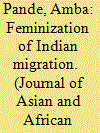

|
|
|
|
|
| Summary/Abstract |
The migration of women or female migration has emerged as an important field of research within the larger domain of migration studies and is being extensively explored under various disciplines. This growing trend can be attributed to some major developments in international migration such as rising numbers of women migrants, growth of women-centric occupations, migration of women in an independent capacity, women-related legislations and growth of gendered perspectives on various issues. These factors together increased the visibility of women in the migration process and have given rise to what has been termed the ‘feminization of migration’. This paper explores the various nuances of the feminization of migration and aspects of female migration focusing on India. It begins with an overview of the growing numbers of women in the migratory flows and goes on to determine that despite the rising numbers and increased participation of women in the developmental dynamics of migration, they remain increasingly vulnerable and exposed to exploitation. The paper also highlights some of the critical policy decisions of the Government of India. The paper concludes that feminization of migration has undoubtedly increased the visibility of women in the migration discourse but much more needs to be done in terms of generating appropriate data, highlighting women’s role in the developmental process, evolving policies for ensuring their protection and security and above all empowering them and increasing their participation in the labour market.
|
|
|
|
|
|
|
|
|
|
|
|
|
|
|
|
| 2 |
ID:
186840


|
|
|
|
|
| Summary/Abstract |
There are inadequate empirical studies on non-farm livelihood choices of rural households in the state of West Bengal, India. This study aims to explore the determinants that effect the choice of households to engage in non-farm economic activities. The present study found that non-farm livelihood diversification factors are more heterogeneous and mainly depend on households’ strategic decisions. A household’s choice of non-farm livelihood activity is determined by binary aspects opportunity-driven versus distress-driven, but it is a complex transformation phenomenon. It has been noticed that within the non-farm livelihoods, share of wage labour (38.3%) is higher, followed by non-farm businesses (19.8%), service providers (18.0%), and salaried jobs (3.4%). The location and distance to the town from the households, food insecurity, and agricultural land size are more influential and statistically significant factors in choosing non-farm livelihood practices. The Mahatma Gandhi National Rural Employment Guarantee Act (MGNREGA) has negatively impacted rural non-farm livelihood activities. There is an 18% and 39% probability of reducing non-farm business and services compared to the increasing MGNREGA work opportunities. Moreover, the likelihood of non-farm business choices has increased by 56% due to rainfall and temperature-change-induced disasters.
|
|
|
|
|
|
|
|
|
|
|
|
|
|
|
|
| 3 |
ID:
186837
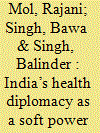

|
|
|
|
|
| Summary/Abstract |
India and Africa have been sharing a multidimensional relationship of cooperation and friendship since the ancient civilizations. The COVID-19 pandemic has brought new possibilities and opportunities for India to leverage its soft power diplomacy towards Africa. The paper’s main focus is to analyze how India has made soft power part of its foreign policy and examine India’s relationship with the African continent through health diplomacy. A literature search was done in major databases, such as Web of Science, Medicine/PubMed, Scopus, OVID, and Google Scholar search engine to gather relevant information. Through humanitarian assistance and geopolitical influence, India had won the support and heart of Africans. Besides, India has become a global healthcare provider in the African continent through its global health diplomacy and vaccine diplomacy. India has achieved impressive gains through its soft power diplomacy and has become a compassionate and benevolent actor in the African continent.
|
|
|
|
|
|
|
|
|
|
|
|
|
|
|
|
| 4 |
ID:
186842
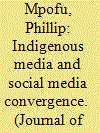

|
|
|
|
|
| Summary/Abstract |
Storytelling is ordinarily trivialised as an antiquated oramedia genre, and of less significance in Zimbabwean mainstream media and communication studies, hence it is understudied. Recent studies largely take a literary gaze on storytelling, and do not theorise it from an indigenous media viewpoint or appreciate its convergence with social media. Drawing on concepts of media convergence and the digital public sphere, this netnographic study examines the adaptation of storytelling on Twitter, SoundCloud and YouTube, focusing on patterns of production, delivery, participation, language forms, reception and audiences. The article shows inventive re-embodiment and adaptation of storytelling on online spaces, that is, the endurance and remaking of indigenous media in the context of new media and communication technologies. The manifestation of the folktale narrative style on social media exhibits the rise of a secondary form of orality recreated, reproduced and applied in the digital form and on social media. While digital and social media are perceived as threatening the continued existence of indigenous media, this article attests social media as breathing spaces for indigenous media.
|
|
|
|
|
|
|
|
|
|
|
|
|
|
|
|
| 5 |
ID:
186839
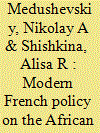

|
|
|
|
|
| Summary/Abstract |
This article focuses on the policy of France’s Fifth Republic on the African continent, primarily in the area of historical French influence formed during the colonial period. We analyze the conditions, prerequisites, and mechanisms for the development of cooperation between France and the African states, with reference to the implementation of France’s national interests. In this study, we aim to identify and generalize the models and methods of pursuing French national interests on the African continent, including in connection with the development of individual African states, as well as the impact of globalization.
|
|
|
|
|
|
|
|
|
|
|
|
|
|
|
|
| 6 |
ID:
186847
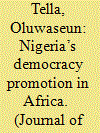

|
|
|
|
|
| Summary/Abstract |
Democracy promotion is undoubtedly one of Nigeria’s most important foreign policy objectives in Africa. Indeed, it has featured in the state’s foreign policy across successive administrations including military and civilian regimes. A fundamental question explored by this article is the dimension of power Nigeria deploys in its foreign policy objective of democracy promotion in Africa. Is it hard or soft, or a combination of the two (smart power)? Using three case studies – Sierra Leone, São Tomé and Príncipe and The Gambia – the article reveals that Nigeria has deployed all three dimensions of power. While this reflects the peculiar circumstances of these particular states in constitutional crisis, Nigeria’s domestic situation, including the type of political system (democratic or authoritarian) and the personality of the president at a given time, as well as trends in the global arena, are also germane. By its very nature, democracy promotion depends on a state’s soft power as the admirable domestic values of the soft power state attract other states to emulate its democratic practices. However, as the case study of Nigeria shows, a state can deploy soft, hard or smart power in its quest to promote democracy depending on the domestic circumstances of both the soft power and recipient states.
|
|
|
|
|
|
|
|
|
|
|
|
|
|
|
|
| 7 |
ID:
186844
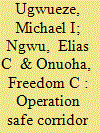

|
|
|
|
|
| Summary/Abstract |
The devastation of lives, livelihood and property in Nigeria caused by over a decade of insurgency by the Boko Haram terrorists is a subject of security, policy, humanitarian and academic concern. Several counter-measures have been adopted by both state and non-state actors to combat the insurgency with limited successes recorded. Consequently, studies have examined several efforts taken by the Nigerian government toward ending the Boko Haram insurgency, including the challenges confronting such efforts. However, Nigeria’s de-radicalization, rehabilitation and reintegration programme for ex-Boko Haram fighters, known as Operation Safe Corridor, has received marginal attention in literature. The Operation Safe Corridor programme which was established in September 2015 is aimed at de-radicalizing, rehabilitating and reintegrating repentant Boko Haram insurgents into society. Using a field survey method involving key informant interviews and focus group discussions as well as documentary reports, this article examines the progress and pitfalls of the Operation Safe Corridor programme. It argues that the failure to mainstream the concerns of local communities both in policy and programming of Operation Safe Corridor severely undermines the prospect of successful and effective reintegration of ex-Boko Haram fighters. The article concludes that if this gap is not addressed, the programme will succeed in terms of the number of ex-combatants graduating from it but will fail in terms of reintegrating the graduating ex-combatants into society. This poses significant risks to both Boko Haram defectors and society at large.
|
|
|
|
|
|
|
|
|
|
|
|
|
|
|
|
| 8 |
ID:
186846
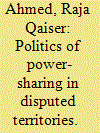

|
|
|
|
|
| Summary/Abstract |
The proper functioning of the government and administration of Azad Jammu and Kashmir (AJK) is taken care of by Pakistan through the successive installment of courts and a series of acts that inter alia include the 1962 Act, the 1970 Act, and the Interim Constitution Act 1974. This paper discusses power-sharing arrangements in AJK, and makes connections to asymmetrical federalism and liminality. It further dissects the matrix of the 13th amendment in the constitution of Azad Kashmir and how it changed the nature of the relationship between AJK and Pakistan. The paper also underscores the contemporary contours of state and polity in AJK and the debate on the 14th amendment.
|
|
|
|
|
|
|
|
|
|
|
|
|
|
|
|
| 9 |
ID:
186838


|
|
|
|
|
| Summary/Abstract |
Sexuality has always been a closely guarded subject in both Christianity and African Traditional Religions (ATRs), and regarded as a sensitive topic unfit for public discussion. In Zimbabwe, there is an emerging trend of sex gospel in Pentecostal Christianity. This has stirred mixed feelings among Christians and ATR adherents. Deploying the religion and social transformation perspective, this netnographic study of Christopher Kapandura of ZAOGA (FIFMI) and Lucia Gunguwo of Eternal Word Ministries’ sermons, explores the eccentric development and argues that sex gospel is inevitable. It is a positive response to social transformation. However, this topical issue grapples with challenges of dissemination methods in the broad public space. The study shows preachers’ creativity and innovation in brand formation in a highly competitive religious market. This is a timely contribution to the meagre scholarship on sex gospel in Pentecostal Christianity, especially its relevance in the context of social change.
|
|
|
|
|
|
|
|
|
|
|
|
|
|
|
|
| 10 |
ID:
186841


|
|
|
|
|
| Summary/Abstract |
The collapse of the Mubarak regime on 25 January 2011 marked the beginning of profound discursive challenges in Egypt. Following the January Revolution, the political forces and discourses long suppressed by Mubarak finally felt free to participate in the political struggles of the time, and attempted to lead the charge in the rebuilding and reorganizing process of Egyptian society. To shed light on the origin and characteristics of these discourses, attempts have been made in this paper to explain through discourse analysis the four major political discourses in today’s Egypt: democratic Islamism, authoritarian Islamism, secular democracy, and secular authoritarianism, and also to identify the political groups representing each discourse, their target groups, the method of their argumentation, and finally their proposed political agenda. To explain these discourses, the a posteriori discourse method is used, i.e. identifying the history of the formation of components and features of discourses. To this end, the discourse analysis of theorists such as Foucault and Van Dyke has been used to examine political discourses in Egypt. The factors used to examine the discourses are: discourse producers, discourse audiences, discourse content, and discourse actions.
|
|
|
|
|
|
|
|
|
|
|
|
|
|
|
|
| 11 |
ID:
186843
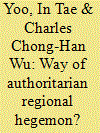

|
|
|
|
|
| Summary/Abstract |
How has China contributed toward the conclusion of the Regional Comprehensive Economic Partnership (RCEP)? The extant literature tends to either undervalue China’s role or emphasizes the absence of China’s willingness to realize the RCEP. However, it is difficult to form region-wide multilateral preferential trade agreements (PTAs), such as RCEP, without any significant contribution from a regional hegemon, such as China. This paper, thus, argues that China has contributed significantly toward the conclusion of RCEP by engendering incentives for member countries to join through multiple cooperative structures. These cooperative structures involve China-led bilateral PTAs and international development forums, which include the Belt and Road Initiative and Asian Infrastructure Investment Bank. With the gradual shift from bilateral to multilateral PTAs and forum-linkage strategies, China turned to be more assertive in concluding the RCEP than in the early years of RCEP negotiations, as evidenced by the discourse of political and opinion leaders.
|
|
|
|
|
|
|
|
|
|
|
|
|
|
|
|
| 12 |
ID:
186836


|
|
|
|
|
| Summary/Abstract |
This paper empirically investigated the trade competitiveness and trade potential of Pakistan and ASEAN countries in the Chinese market. The study utilizes trade data for the period of 2003–2019 to assess the bilateral trade aspects by using an extended gravity equation. In addition, the PPML model and constant market share analysis are applied to examine trade potential and competitiveness, respectively. Market size, distance, trade openness, revealed comparative advantage position and common border play an important role in bilateral trade of Pakistan and ASEAN with China, and coefficients of all these variables comply with the economic theory and are statistically significant. Pakistan along with Brunei, Cambodia, Laos, Myanmar, Philippines, and Thailand has great trade potential in the Chinese market. Particularly Cambodia and Vietnam are enjoying the highest competitive advantage as compared to other ASEAN countries. Pakistan’s export performance in China’s market relies on the market distribution effect. Based on this study, we have discussed country-specific future policy discourse for Pakistan and ASEAN countries in detail.
|
|
|
|
|
|
|
|
|
|
|
|
|
|
|
|
|
|
|
|
|